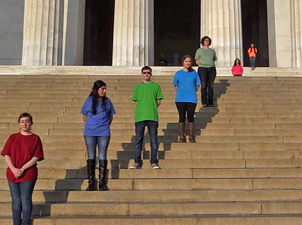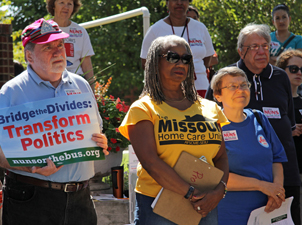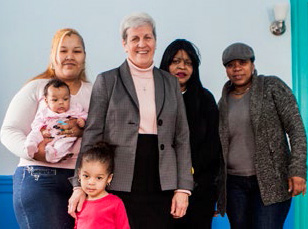
Supporting Tax Policies that Benefit Women and Families
Anna Chu and Jillian Edmonds
August 16, 2017
The Trump administration and Republican leaders in Congress have promised to release a tax reform plan this summer, which is likely to include some of the largest tax cuts in decades. As elected officials debate tax reform, we must ensure policies that slash taxes for the wealthy few and big corporations under the guise of growing the economy do not become the new law of the land. The fallacy that tax cuts for the rich and corporations grow the economy has been the conservative talking point since Ronald Reagan first touted trickle-down economics, and has been widely discredited.[i] But not only is President Trump sticking to the same failed playbook of the past, the tax principles he released in April lack some of most important tax strategies that would help working families. For example, his principles do not mention expanding the Earned Income Tax Credit (EITC), an effective anti-poverty program which would greatly benefit working women and families. In 2013, the EITC lifted 6.2 million people – including 3.2 million children – out of poverty (when taking into account the indirect employment and earnings effects of the EITC, this number nearly doubles).[ii]
Although there are reports that President Trump is considering improvements to the Child and Dependent Care Tax Credit, those potential improvements alone do not mitigate the other troubling aspects of his tax plan. For instance, President Trump proposes reducing the corporate tax rate by 60 percent and getting rid of the estate tax, which impacts only the richest 0.2 percent of estates (including his own estate).[iii] Coupled with his budget, which guts crucial programs that provide basic living standards to low-income Americans, what emerges is a clear picture of the Trump administration’s economic policy—giving big payoffs for the wealthy few and big corporations, while pulling the rug out from everyday women and their families.
Tax Cuts for the Rich Just Make the Rich Richer
President Trump’s tax plan would be a massive giveaway to wealthy Americans and big corporations, and would harm women and families if enacted into law. He proposes slashing the top marginal individual tax rate to 35 percent and consolidating the current seven tax brackets into three. He also proposes slashing the corporate tax rate to an astoundingly low 15 percent. While he claims that such tax cuts would grow the economy and “create 25 million new jobs over the next decade,” this couldn’t be further from the truth. A Congressional Research Service analysis of the top tax rates since 1945 found little or no association between reducing taxes on the wealthy and increased savings, investment, or productive growth.[iv] A review of research by the Center on Budget and Policy Priorities of the impacts of a 1993 tax hike and the 2001 tax cut also revealed that job creation and economic growth were actually stronger in the years after the 1993 tax increases than in the years following the 2001 tax cuts.[v]
Instead of creating jobs or economic growth, tax cuts for the rich just make the rich richer. An analysis of OECD countries found that there was no correlation between the top tax rates and economic growth, but there was a correlation between lower top tax rates and greater income inequality.[vi] The earlier CRS study also found that cutting the top tax rate concentrates wealth at the top of the income spectrum because it incentivizes higher pay at the top end of the scale and allows those people to keep more of that money. By cutting taxes for the wealthy and corporations, President Trump’s tax plan will contribute to growing economic inequality in our nation, which harms both our current economy and future growth.
Tax Cuts Threaten Funding for Critical Programs
While women and families likely won’t get a fair shake in this upcoming tax plan, it’s not their only worry. President Trump’s tax principles work alongside his federal budget, which would cut programs that provide a basic living standard to low-income families. His budget proposes eliminating heating assistance for people in poverty, funding for meals for seniors, and several housing assistance. These cuts will affect women the most, potentially creating an even greater poverty gap between men and women. The Tax Policy Center found that cutting the corporate income tax to 15 percent would cost $2.4 trillion 10 years — and that number skyrockets to $4 trillion if the 15 percent rate applies to pass-through income.[vii]
Unless the White House plans to simply increase the deficit, these tax cuts must be paid for somehow. The Trump administration has claimed it would pay for these cuts by raising tax revenue from other sources and from economic growth, but the budget shows they are more than happy to slash critical programs that provide a basic living standard for women and families. President Trump’s budget proposes dismantling Medicaid as we know it and cutting its funding above and beyond the cuts in the ACA Repeal Bill. SNAP funding would be cut by nearly $200 billion over the next decade – which would result in many states making it more difficult for families to get food assistance..
The President’s desire to give huge tax cuts to wealthy people such as himself and take away critical programs that are lifelines for many women and families flies in the face of what his voters wanted and is a recipe for economic disaster. We can learn from what happened in Kansas, where massive tax cuts enacted in 2012 led to decreased revenue, underfunded schools, and cuts to services. Massive budget cuts won’t make America great again – but they are likely to hurt many people.
A Tax Plan that Actually Helps Women and Families
Our tax policies should help the most vulnerable Americans by improving family tax credits and raising enough revenue for programs and services that support struggling families, rather than giving more tax cuts and loopholes to the wealthy and corporations. To have a tax plan that actually helps working women and families, President Trump and Congressional leadership should consider abiding by the following principles:
- Don’t give more tax cuts for the wealthy and big corporations.They should pay their fair share in order to have a tax system that works for all of us.
- Tax policies shouldhelp the most vulnerable now. Tax reform should preserve — and improve — tax credits like the Earned Income Tax Credit, Child Tax Credit, and Child and Dependent Care Tax Credit that help families make ends meet.
- Support progressive tax reforms that would raise needed revenue— and expand opportunity for a stronger future for everyone. Every year, special interest tax loopholes cost the federal government billions of dollars. That’s money that could be used to support struggling families and give them a chance for a better life.
A tax policy that supports women and children requires that everyone pays their fair share regardless of their income or political power. It allows the government to fully support families that need assistance when they are struggling, as well as fund public parks, clean air enforcement, and other government activities that benefit everyone. Rather than giving the wealthy and corporations the largest slice of the pie, a tax policy that supports women and children expands the pie for everyone, resulting in more opportunities that keep America great.
[i] CNN Money. “The ‘trickle down theory’ is dead wrong.” http://money.cnn.com/2015/06/15/news/economy/trickle-down-theory-wrong-imf/
[ii] Center on Budget and Policy Priorities (CBPP). “EITC Boosts Employment; Lifts Many More Out of Poverty Than Previously Thought.” http://www.cbpp.org/blog/new-research-eitc-boosts-employment-lifts-many-more-out-of-poverty-than-previously-thought
[iii] CBPP. “Repealing Estate Tax Would Provide Windfall to Heirs of Wealthiest Estates.” http://www.cbpp.org/research/federal-tax/repealing-estate-tax-would-provide-windfall-to-heirs-of-wealthiest-estates
[iv] Congressional Research Service. “Taxes and the Economy: An Economic
Analysis of the Top Tax Rates Since 1945.” https://fas.org/sgp/crs/misc/R42729.pdf
[v] CBPP. “Recent Studies Find Raising Taxes on High-Income Households Would Not Harm the Economy.” http://www.cbpp.org/research/recent-studies-find-raising-taxes-on-high-income-households-would-not-harm-the-economy?fa=view&id=3756
[vi] Piketty, Thomas and Emmanuel Saez. “Top Incomes and the Great Recession: Recent
Evolutions and Policy Implications.” http://www.imf.org/external/np/res/seminars/2012/arc/pdf/PS.pdf
[vii] CNN Money. “A 15% corporate tax rate could be very expensive.” http://money.cnn.com/2017/04/24/news/economy/trump-corporate-tax-rate/
[viii] National Women’s Law Center. “Cutting Programs for Low-Income People Especially Hurts Women and Their Families.” https://nwlc.org/resources/cutting-programs-low-income-people-especially-hurts-women-and-their-families/
Originally published in Connection Magazine. Read the full issue here.












